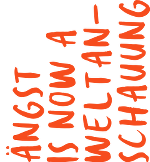Jazra Khaleed | GRC Autor, Übersetzer, Publizist, Filmemacher | geboren 1979, Grosny (Tschetschenien), lebt in Athen und schreibt Gedichte auf Griechisch. Seine Werke wurden vielfach übersetzt und in Europa, den USA und Australien publiziert. Auf Deutsch zuletzt: „Bin ohne Menschen“ (Hochroth 2010), „Jazra Grosny“ (Distillery, 2013). Mitbegründer des Lyrik-Magazins TEFLON.
Greek society is deeply conservative, reactionary and sexist. However, there are people who fight against fascism and racism, people who revolt against a political system that presents itself as ‘democratic’ but asserts its authority by the most stringent police control and tries to silence any voices of opposition and dissent. I strongly believe that in Greece poetry can be part of the anti-fascist, anti-sexist and working class discourse. There are autonomous anti-fascist and feminist groups that publish magazines, do demonstrations, put posters on the walls. Poetry can be a part of this discourse.
Actually, poetry has always been the major voice of poor, working class people, of oppressed, objectified groups. Because, “of all the art forms”, to quote Audre Lorde, “poetry is the most economical. It is the one which is the most secret, which requires the least material, and the one which can be done between shifts, in the hospital pantry, on the subway, and on scraps of surplus paper.”
Fortunately, as I have found out, there are many people in Greece who share these ideas. In 2008 some friends and I started publishing a biannual poetry magazine called Teflon. It has now reached its nineteenth issue. It has a circulation of 1,000 copies, it is distributed for free, it has no sponsors and contains no advertisements. It is produced, financed and distributed by its editorial team, its friends and its subscribers.
From the beginning, we sought to sidestep the establishment as it is defined by most Greek literary magazines and publishing houses. We wanted to support young poets, present original ideas, and relate poetry to what’s happening in Greek society today. We sought to present and promote experimental poetry, writers who distort the language of power, rendering it ridiculous, compelling it to tell the truth. We wanted a magazine that would publish poetry and essays with an anti-capitalist, anti-fascist and feminist perspective.
Till now, we have presented more than one hundred poets from all over the world. Much of our work is based on research, especially when we present the work of older poets who took part in the anti-capitalist and feminist movements of the ’60s and the ’70s. We do lots of research on the sociopolitical background of writers as we believe that poetry gives voice to the oppressed and the invisible and fights racist propaganda and discourse. We believe that poetry can help us understand that the fascism and sexism of the past and the present are on a continuum.
We can be inspired by the Italian working class in the 1970s as described by Nanni Balestrini. We can be inspired by the fights of the black proletariat in the 1960s and ’70s as described by Nikki Giovanni and the Last Poets. We can be inspired by the fights of the Australian Aborigines as described by Lionel Fogarty and Mudrooroo. By the courage and the fighting spirit of the American Black Lesbians like Pat Parker and Cheryl Clarke.
The magazine was embraced by squats, self-organized social centers and anti-fascist groups. We found out that there are actually many people in Greece who agree with us that poetry is a powerful way to break silence around certain issues —such as fascism, racism and the nationalistic tendencies that flourish in Greek society, the drownings of immigrants in the Aegean Sea, the devaluation of our lives and labor.
Our most popular event so far has been one where we presented and performed the work of Arab-american women poets like Suheir Hammad, Mohja Kahf and Lisa Suhair Majaj, poets who break the stereotype of the voiceless, subdued Arab woman, a racist stereotype that goes part and parcel with that of the violent and backward Arab man. It was a good opportunity for us to add our voices to all these poets who rise up against patriarchy, racism and militarism.
